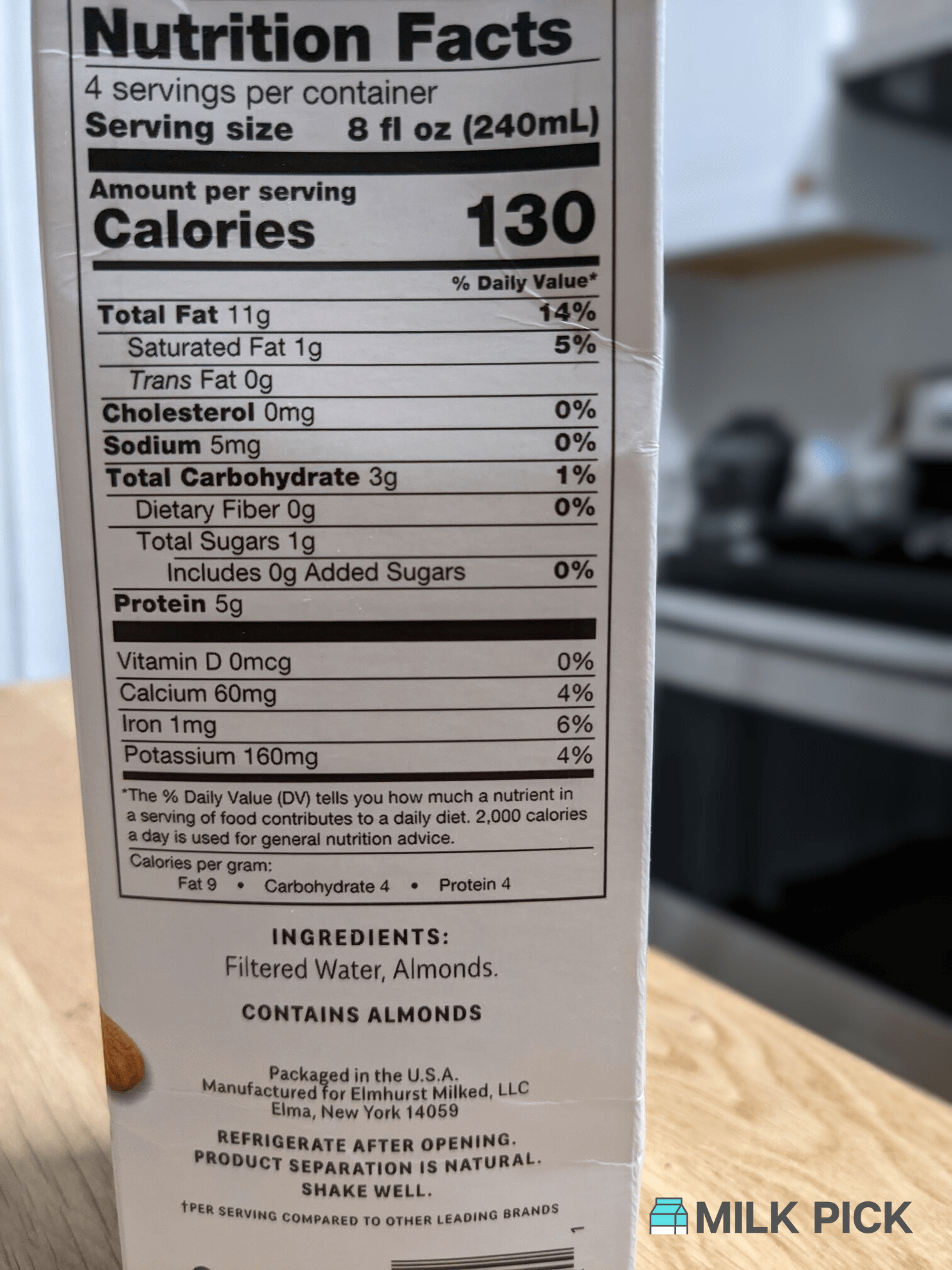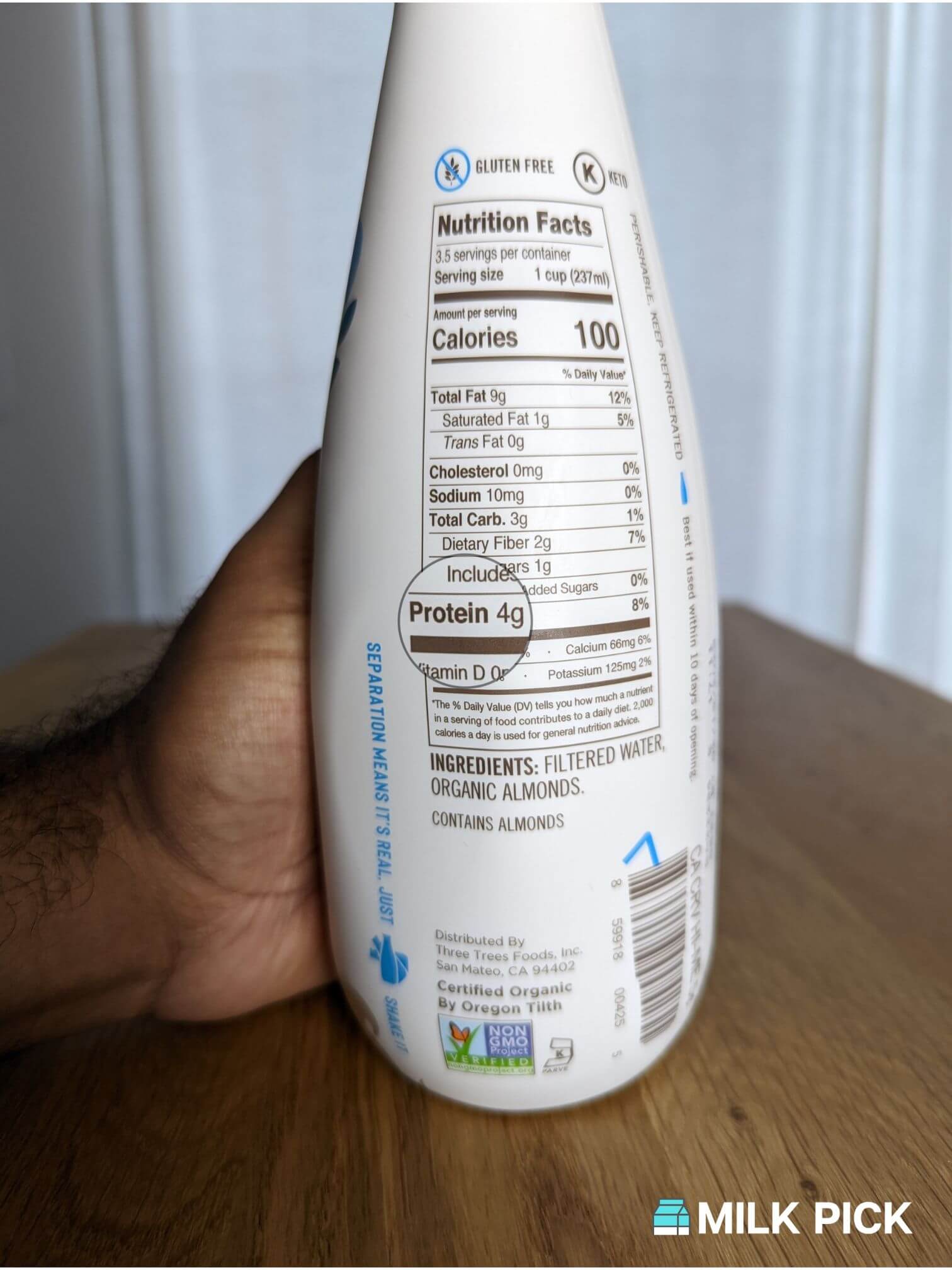Almond milk has become the most popular dairy milk alternative in the U.S. Still, some people are weary about whether or not it’s worth making the switch.
If you’re on the fence about whether or not almond milk is a healthy (and delicious) alternative to dairy, read on to learn more about the pros and cons of almond milk!
Quick Answer
What are the pros and cons of almond milk?
Pros of almond milk include that it’s low in saturated fat and calories while being high in essential nutrients like vitamin E. Some cons of almond milk are that it can be low in protein, may have additives, and it’s low in iodine.
The Advantages & Disadvantages of Almond Milk
We could write a novel about all the pros and cons of almond milk. But for the sake of not wasting your time, we will highlight some of the most important pros and cons.
Important pros of drinking almond milk are that it’s low in saturated fat and a low-calorie milk option. Research shows that saturated fats increase your risk of cardiovascular disease. In addition to preventing heart disease, the low caloric value will help you manage your weight.
The other pro is that almond milk is rich in the antioxidant vitamin E. Research shows this antioxidant helps your body reduce free radicals that can cause harmful damage and disease in your body.
Some of the cons are that it’s low in protein and iodine. Protein is a key nutrient for building muscle and maintaining many of your bodily functions. While iodine is important for promoting healthy thyroid function.
Some commercial almond milk may also come with an array of unhealthy additives that can have negative impacts on your health. All of these pros and cons are things to consider when choosing your milk.
Let’s dive deeper into each of these pros and cons.
Pro #1: Low in Saturated Fat
Saturated fats have been demonstrated to increase your risk of cardiovascular disease. This is in part because these saturated fats increase your low-density lipoprotein levels or your “bad” cholesterol.
When your “bad” cholesterol levels increase, it leads to blockages in your arteries because of plaque buildup. This can result in health complications like high blood pressure, a heart attack, or a stroke.
Because almond milk lacks saturated fats, it reduces your risk for these health conditions. So if your cardiovascular health is a top priority for you, almond milk may be a good fit.
Pro #2: Low in Caloric Content
Another major pro is that almond milk is low calorie. This is especially true when compared to many dairy milk options.
The average eight-ounce cup of unsweetened almond milk has 40 calories. The same eight ounce cup of 2% fat dairy milk contains 122 calories.
This means almond milk has only about a third of the calories compared to 2% fat dairy milk. Even fat-free dairy milk has about 80 calories per eight ounce serving.
The calories in almond milk depend largely on the brand. Many lower-calorie almond milk options contain fewer almonds, while brands with more almonds per serving like Elmhurst and Three Trees tend to have a higher calorie count.

Because your overall caloric intake impacts your weight management, drinking almond milk may be an easy way to cut calories in your diet. Baking and cooking with it will also help reduce calories in your diet.
Keep in mind that sweetened and flavored variations of almond milk will have more calories due to the added sugar. So it’s best to opt for an unsweetened variation of almond milk if weight loss or maintenance is your goal.
Pro #3: High in Antioxidant Vitamin E
One of the other key pros of almond milk is that it’s particularly rich in vitamin E.
Vitamin E is an important antioxidant. Antioxidants help eliminate free radicals in our body that can speed up aging and result in dysfunction in our body.
Research shows that increasing your vitamin E intake may help ward off diseases like cancer, cataracts, arthritis, and other negative aging effects.
One eight-ounce cup of almond milk contains about 50% of your daily value of vitamin E. Just two cups a day could assure that you’re getting sufficient vitamin E in your diet.
Minimizing the impact of the aging process and reducing your risk for diseases is a very appealing benefit of almond milk.
Con #1: Low in Protein
Now, we will move on to the cons related to almond milk. First on the con list is that almond milk is not a rich source of protein.
Protein is an important nutrient when it comes to both building and maintaining muscle mass. Now you may be thinking to yourself that you don’t care about getting big muscles or being strong.
But we naturally lose muscle mass as we age. And this can be the difference between being able to get out of a chair on your own or needing help.
Prioritizing dietary intake of protein is one way to help minimize the loss of muscle alongside a resistance strength training program. Unfortunately, most almond milk you see in stores only has about one gram of protein per eight ounce serving.
You can counteract this by choosing brands with a higher almond:water ratio, like the two we mentioned above (Elmhurst and Three Trees).
Elmhurst almond milk contains 5g of protein, and Three Trees contains 4g.

An eight ounce glass of 2% fat dairy milk will have upwards of 8 grams of protein. So if you use your milk as a way to boost your protein consumption, opt for one of the brands above or consider mixing it with protein powder.
Con #2: Many Commercial Products Have Additives
Another major con to almond milk is that many commercial variations have unhealthy additives. These additives are used to “enhance” the taste and texture of almond milk.
One additive that is common in many commercial almond milk is natural flavor. Natural flavor is any flavoring derived from a plant or animal found in nature.
While that may not sound so bad, genetically modified crops can be used to make natural flavors. Research has also linked natural flavors to an array of adverse health side effects.
Another common additive in almond milk is canola oil. In animal studies, canola oil has been found to increase inflammation and oxidative stress which can lead to potential health concerns.
It’s clear that you want to avoid additives in your almond milk for the sake of your health. There are brands that do not include additives (Elmhurst, Three Trees, and JOI to name a few), so we suggest sticking to those when possible.
Con #3: Low in Iodine Which May Impact Thyroid Function
One last con worth considering when picking out your milk is that almond milk is low in iodine. You’re probably asking yourself why you should care about iodine.
Iodine is an essential nutrient for promoting optimal thyroid function. If your iodine is too low, you may experience reduced function of your thyroid, which is essential for many physiological processes.
Research has found that almond milk is low in iodine and that this could be contributing iodine insufficiency in the general population. And since we know iodine is important for your thyroid, we want to avoid being deficient in it.
This is particularly important for females as they tend to be at a higher risk for developing thyroid dysfunction.
If you’re someone who struggles with your thyroid function and isn’t getting enough iodine in your diet, take this into consideration when picking almond milk. However, keep in mind there are other ways to get dietary iodine into your diet as well.
Is There Anyone Who Should Avoid Almond Milk Altogether?
There is only one population that should absolutely avoid almond milk in spite of the pros—anyone allergic to almonds or tree nuts.
These individuals could experience adverse effects from consuming almond milk. They could range from mild in the form of a rash to severe in the form of anaphylactic shock.
If you think you may have an allergy to almonds or tree nuts, it’s in your best interest to get tested.
Unfortunately, if you know you are allergic to almonds or tree nuts, consuming almond milk is a hard no for you.
Is Almond Milk The Right Choice For You?
Every type of milk will come with pros and cons. Almond milk is no different. While we could make an extensive list of all the pros and cons, we have highlighted the most important ones here.
Some of the key pros are that almond milk is low in saturated fats and calories, which will help protect your heart health while promoting weight maintenance. Almond milk is also rich in the antioxidant vitamin E, which will reduce damage to the cells of your body to reduce your risk of disease.
Some of the cons are that almond milk is low in protein and iodine, which can negatively impact your muscle mass and thyroid function. Some almond milk also contains unhealthy additives that may aggravate your gut health.
Only you can decide, based on the pros and cons, whether almond milk is the right choice for you. If you have any concerns regarding its impact on your personal health, it may help to consult with your doctor or a registered dietician.
While only you can make the decision regarding which milk is best for you, many of the pros of using almond milk for your health outweigh the cons.
